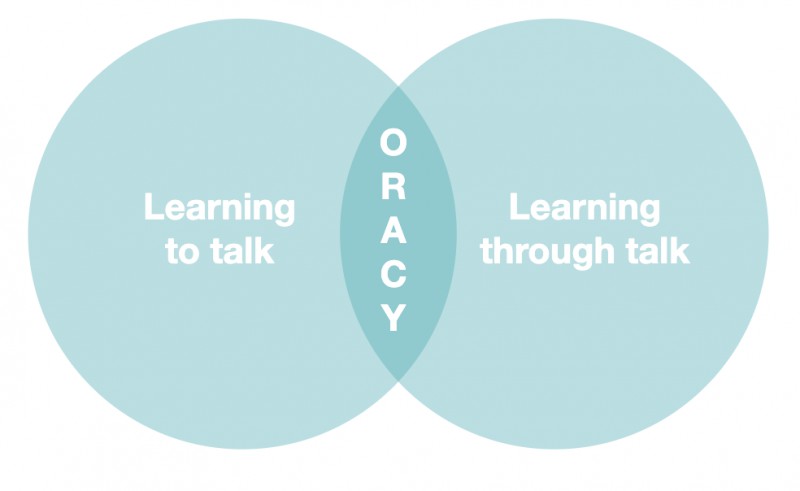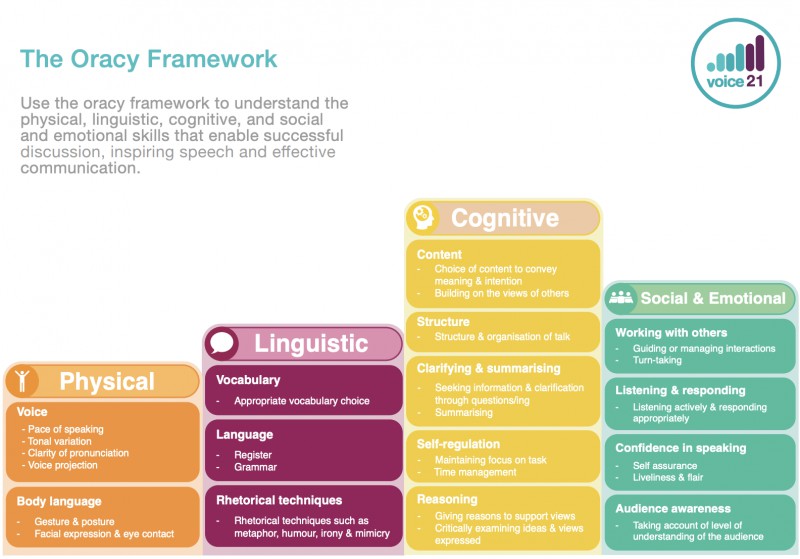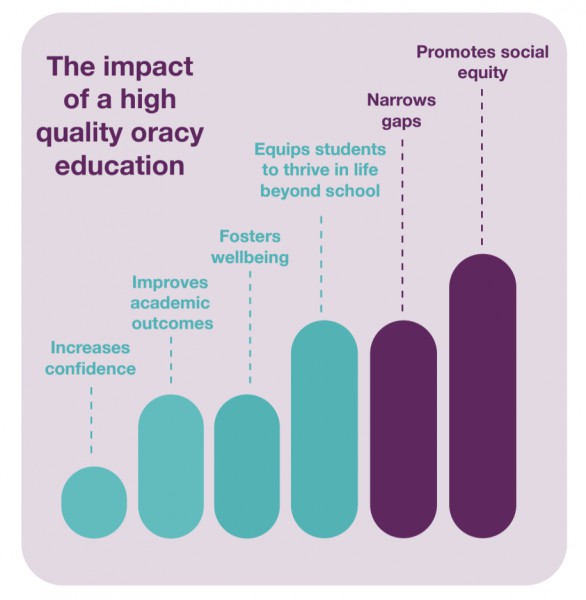Oracy
What is Oracy?
Oracy is the ability to articulate ideas, develop understanding and engage with others through spoken language. In school, oracy is a powerful tool for learning; by teaching students to become more effective speakers and listeners we empower them to better understand themselves, each other and the world around them.
Through a high-quality oracy education students learn through talk and to talk. This is when they develop and deepen their subject knowledge and understanding through talk in the classroom, which has been planned, designed, modelled, scaffolded and structured to enable them to learn the skills needed to talk effectively.
The deliberate, explicit and systematic teaching of oracy across phases and throughout the curriculum will support children and young people to make progress in the four strands of oracy outlined in the Oracy Framework.
These skills are crucial to children and young people’s success in school and in their life beyond. It is therefore vital that in every school, an education in oracy is the responsibility of every teacher and the entitlement of every child.
As a Voice 21 Oracy Hub school we have been developing and nurturing these skills with our students both in and outside of the classroom and we have been supporting other schools in Leicester and across Leicestershire and Nottinghamshire to do the same.


What are the benefits of an Oracy education?
Oracy increases confidence, empowering students with the belief that their voice has value, developing the ability to articulate thoughts so others will listen
Research has shown that structured talk in class benefits students’ confidence and self-esteem. Sometimes, teachers tell us that when they began working on oracy they were worried shy or quiet children would be left out. But as they continue planning talk into lessons, these children ‘come out of their shells’ - clear expectations, scaffolding and modelling of talk allow all children to succeed, not just those who were confident talkers to begin with.
Oracy improves academic outcomes, developing learners who can think critically, reason together and have the vocabulary to express their knowledge and understanding
Oracy Fosters wellbeing, supporting students to build successful relationships, talk through issues, express feelings and resolve conflicts
The intuition that wellbeing is supported by talk, whether that’s talking through a problem with a friend, or using talk to build strong relationships in the first place, is well supported by the research literature.

Oracy equips students to thrive in life beyond school helping them to progress, access employment and engage in civic life
Discussion and debate are central to democratic life - the oracy skills needed to discuss complex or emotive issues with honesty and compassion are crucial. Greta Thunberg captured imaginations around the world, showing the power young people’s voices can have. Oracy is also important for students to thrive in employment, with businesses frequently emphasising the value of teamwork and communication skills.
Oracy narrows gaps enabling disadvantaged students to fulfill their potential
Students from economically advantaged backgrounds, on average, start school ahead of their disadvantaged peers in terms of language and communication skills. Without intervention, these gaps grow, as pupils with the strongest language skills make the most progress in all areas of the school curriculum. In contrast, a high quality oracy education can help to narrow this gap, breaking the link between a child’s start in life, and their future success. The research shows that students from disadvantaged backgrounds make faster progress than their advantaged peers, when accessing a high quality oracy education.
Our Oracy Lead Chaitan Rajania was able to evidence this in our context through an Oracy enquiry project in 2019; those teachers that supported learning through talk in their lessons showed a reduction in the attainment gap between disadvantaged and non-disadvantaged students.
Oracy promotes social equity leading to a fairer society where everyone, regardless of background, finds their voice for success in school and in life.
As Neil Mercer (Emeritus Professor of Education at the University of Cambridge and Director, Oracy Cambridge) said, “You are the only second chance for some children to have a rich language experience. If these children are not getting it at school, they are not getting it.”
What is Madani Oracy?
Our vision is underpinned by 3 principles; educational excellence; safety and well-being and being prepared for adult life. We believe that the use of Oracy supports all three of those principles and therefore we have embedded the use of Oracy both implicitly and explicitly and both inside and outside of the classroom. Please click here for further information
Latest News
- Positive points - Rewards
Positive points - Rewards (Whole School - 18/06/2025) - Escape Reality Challenge
Escape Reality Challenge (Whole School - 19/05/2025) - Animal Farm
Animal Farm (Whole School - 13/02/2025) - Butterfly Farm (Year 7)
Butterfly Farm! (Year 7) (Whole School - 10/02/2025) - Shakespeare's Schoolroom (Year 7)
Shakespeare's Schoolroom (Year 7) (Whole School - 10/02/2025)
